Able Noise High Tide LP (World Of Echo)
 Cross-continental European duo Able Noise establish the scale of their music right off the bat: “To Appease” is a dreary guitar/drums slog, made exponentially more maddening by overt tape manipulation, slowing and speeding-up the recording at seemingly random yet frequent intervals. This is gonna clear out at least half the room, and it might be by design, freeing up some space for only the most unshakeable of exasperatingly-experimental guitar music enthusiasts. I’ll admit, I was close to tapping out on that opener, but my patience was rewarded with the rest of the album, which is quite a bit more listenable without relinquishing any of the opening cut’s fearlessness. Acoustic guitars spiral out of control, electric guitars tighten like a blood pressure cuff, vocals wander in on accidental occasion and the drums dazzle through both minimalist post-jazz rolls and a sparseness rendered via advanced mathematics. When things get rolling (and they often do), Able Noise conjure images of Chris Corsano sitting in with Joan Of Arc, Still House Plants interpreting Moin’s songbook and the outtakes of Gastr del Sol’s outtakes. These traditional Guitar Center instruments are pushed to the furthest reaches of song-form, never taking the easy way out (no harsh effects, no structureless improv, no jump-scare production, etc.) and often brilliant for it, though I’m glad they only did that speed-up / slow-down trick once. That was plenty.
Cross-continental European duo Able Noise establish the scale of their music right off the bat: “To Appease” is a dreary guitar/drums slog, made exponentially more maddening by overt tape manipulation, slowing and speeding-up the recording at seemingly random yet frequent intervals. This is gonna clear out at least half the room, and it might be by design, freeing up some space for only the most unshakeable of exasperatingly-experimental guitar music enthusiasts. I’ll admit, I was close to tapping out on that opener, but my patience was rewarded with the rest of the album, which is quite a bit more listenable without relinquishing any of the opening cut’s fearlessness. Acoustic guitars spiral out of control, electric guitars tighten like a blood pressure cuff, vocals wander in on accidental occasion and the drums dazzle through both minimalist post-jazz rolls and a sparseness rendered via advanced mathematics. When things get rolling (and they often do), Able Noise conjure images of Chris Corsano sitting in with Joan Of Arc, Still House Plants interpreting Moin’s songbook and the outtakes of Gastr del Sol’s outtakes. These traditional Guitar Center instruments are pushed to the furthest reaches of song-form, never taking the easy way out (no harsh effects, no structureless improv, no jump-scare production, etc.) and often brilliant for it, though I’m glad they only did that speed-up / slow-down trick once. That was plenty.
Alien Nosejob Turns The Colour Of Bad Shit LP (Anti Fade / Total Punk / Drunken Sailor)
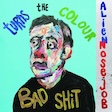 Feels like there are a million fake Alien Nosejobs out there these days, drinking up their cheap beer and stage-diving into an empty clearing in the crowd. The real Alien Nosejob has stylistically expanded and contracted throughout its seven-or-so years of existence, but Turns The Colour Of Bad Shit is streamlined punk hostility, a reminder to all copycats how it’s done. I can’t think of (m)any other artists who’ve worked with both Total Punk and Iron Lung, can you? No ballads, no instrumentals, no dirges, only upbeat punk for parties that tip over into violence, drugs that keep you from sleeping, obligatory leather jackets and optional eyeliner. I was tempted to describe this new album as no-frills, but there are definitely some frills, be it a melodic synth lead or the sax of Alannah Sawyer, all played as if the band is wearing their pants defiantly around their ankles. The additional sonic flavor doesn’t dilute the viscosity of Alien Nosejob’s punk rock snot. You can sense that they looked to the classics for inspiration, entry-level greats like Sex Pistols and The Damned, but Jake Robertson (the sole official member of Alien Nosejob) takes that as a jumping off point for his own wild ideas, always ensuring that memorable hooks and catchy refrains are front and center. That’s the hard part, writing punk songs people will recall by name, but Alien Nosejob has a whole bag of ’em at this point, right down to the Redd Kross-y “Living On A Crust” or the synthed-up Pork Dukes shuffle of “Trapped In Time”, sure to leave you wearing someone else’s beer.
Feels like there are a million fake Alien Nosejobs out there these days, drinking up their cheap beer and stage-diving into an empty clearing in the crowd. The real Alien Nosejob has stylistically expanded and contracted throughout its seven-or-so years of existence, but Turns The Colour Of Bad Shit is streamlined punk hostility, a reminder to all copycats how it’s done. I can’t think of (m)any other artists who’ve worked with both Total Punk and Iron Lung, can you? No ballads, no instrumentals, no dirges, only upbeat punk for parties that tip over into violence, drugs that keep you from sleeping, obligatory leather jackets and optional eyeliner. I was tempted to describe this new album as no-frills, but there are definitely some frills, be it a melodic synth lead or the sax of Alannah Sawyer, all played as if the band is wearing their pants defiantly around their ankles. The additional sonic flavor doesn’t dilute the viscosity of Alien Nosejob’s punk rock snot. You can sense that they looked to the classics for inspiration, entry-level greats like Sex Pistols and The Damned, but Jake Robertson (the sole official member of Alien Nosejob) takes that as a jumping off point for his own wild ideas, always ensuring that memorable hooks and catchy refrains are front and center. That’s the hard part, writing punk songs people will recall by name, but Alien Nosejob has a whole bag of ’em at this point, right down to the Redd Kross-y “Living On A Crust” or the synthed-up Pork Dukes shuffle of “Trapped In Time”, sure to leave you wearing someone else’s beer.
Anadol & Marie Klock La Grande Accumulation LP (Pingipung)
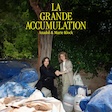 Anadol and Marie Klock met at a British music fest a couple years ago, and I’m sure glad they did, as that encounter led to this collaborative album between the two chic electro-pop artistes. Anadol’s one-of-a-kind blend of synth-y Turkish folk and retro-futurist kosmische is always a year-end chart-topper for me, and French avant-chanson singer Marie Klock’s last Pingipung album featured a cover photo of her pretending to be mounted by a large stuffed animal, so how can we go wrong here? We can’t – La Grande Accumulation is a fancy-free romp starring Anadol’s analog keys n’ rhythms and Klock’s spoken/sung French vocals. Just as the cover image displays the duo shaking hands all business-like in a pile of what appears to be construction-site waste (the “grand accumulation”?), La Grande Accumulation is playful and serious about not being serious. Anadol’s twinkly, nostalgic synths are prominent and charming as ever, like thumbing through a copy of Vogue from 1987, and even though I can only understand a word or two of Klock’s French, it does not prevent me from falling head over heels into the style they’ve created, as dazzling as a maze of mirrors and just as amusing as when you accidentally walk face-first into one. The songs are long and generally avoid the verse/chorus structure, preferring to unfurl like pulpy novellas full of larger-than-life characters with plenty of room for extended keyboard solos, improvised horns and, in the wild and woolly closer “La Reine Des Bordels”, a rambunctious crew of chipmunk voices conversing with a squawking horn ala the adults in any given Charlie Brown special. C’est magnifique!
Anadol and Marie Klock met at a British music fest a couple years ago, and I’m sure glad they did, as that encounter led to this collaborative album between the two chic electro-pop artistes. Anadol’s one-of-a-kind blend of synth-y Turkish folk and retro-futurist kosmische is always a year-end chart-topper for me, and French avant-chanson singer Marie Klock’s last Pingipung album featured a cover photo of her pretending to be mounted by a large stuffed animal, so how can we go wrong here? We can’t – La Grande Accumulation is a fancy-free romp starring Anadol’s analog keys n’ rhythms and Klock’s spoken/sung French vocals. Just as the cover image displays the duo shaking hands all business-like in a pile of what appears to be construction-site waste (the “grand accumulation”?), La Grande Accumulation is playful and serious about not being serious. Anadol’s twinkly, nostalgic synths are prominent and charming as ever, like thumbing through a copy of Vogue from 1987, and even though I can only understand a word or two of Klock’s French, it does not prevent me from falling head over heels into the style they’ve created, as dazzling as a maze of mirrors and just as amusing as when you accidentally walk face-first into one. The songs are long and generally avoid the verse/chorus structure, preferring to unfurl like pulpy novellas full of larger-than-life characters with plenty of room for extended keyboard solos, improvised horns and, in the wild and woolly closer “La Reine Des Bordels”, a rambunctious crew of chipmunk voices conversing with a squawking horn ala the adults in any given Charlie Brown special. C’est magnifique!
Big’n End Comes Too Soon LP (Computer Students)
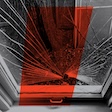 If there is a universal truth to be gleaned from the state of music in 2024, it’s that every band that ever previously existed also currently exists right now. Bands simply do not go away anymore – a breakup is temporary at best – and when one releases their first new album in twenty-eight years the way Big’n just did, it’s as reasonable and acceptable as a brand new group throwing their initial rehearsal up on Bandcamp. I suppose I miss the time back when things were of a certain moment, a moment that wasn’t guaranteed to exist in perpetuity, but at the same time, sitting here with Big’n’s End Comes Too Soon, I feel silly forming anything that could be construed as a complaint. This album is as true to Big’n’s sound as anything else they’ve done, and as they are certified first-wave noise-rock progenitors, they’ve ever right to do it. Recorded at Electrical Audio (naturally), these songs revolve around jagged bass-lines, even more jagged guitar riffs, bare-essential drums played in non-intuitive time signatures, and a vocalist who abandons musical time signatures entirely, blathering and croaking under and over these tightly-compacted rock songs in a manner that cannot avoid a David Yow comparison. The sonic presentation, much as was the case in their earliest days, bears strong resemblance to The Jesus Lizard and Shellac, though more as peers than imitators. Big’n “still got it”, no doubt, and until AI facsimiles of the bands we like proliferate and take over, you can enjoy this contemporary installment of the archetypal noise-rock sound.
If there is a universal truth to be gleaned from the state of music in 2024, it’s that every band that ever previously existed also currently exists right now. Bands simply do not go away anymore – a breakup is temporary at best – and when one releases their first new album in twenty-eight years the way Big’n just did, it’s as reasonable and acceptable as a brand new group throwing their initial rehearsal up on Bandcamp. I suppose I miss the time back when things were of a certain moment, a moment that wasn’t guaranteed to exist in perpetuity, but at the same time, sitting here with Big’n’s End Comes Too Soon, I feel silly forming anything that could be construed as a complaint. This album is as true to Big’n’s sound as anything else they’ve done, and as they are certified first-wave noise-rock progenitors, they’ve ever right to do it. Recorded at Electrical Audio (naturally), these songs revolve around jagged bass-lines, even more jagged guitar riffs, bare-essential drums played in non-intuitive time signatures, and a vocalist who abandons musical time signatures entirely, blathering and croaking under and over these tightly-compacted rock songs in a manner that cannot avoid a David Yow comparison. The sonic presentation, much as was the case in their earliest days, bears strong resemblance to The Jesus Lizard and Shellac, though more as peers than imitators. Big’n “still got it”, no doubt, and until AI facsimiles of the bands we like proliferate and take over, you can enjoy this contemporary installment of the archetypal noise-rock sound.
Ciel & CCL Tilda’s Goat Stare 12″ (Naff)
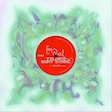 Wading through rivers of mediocre techno music is a passion project of mine. Like crust-punk, even the kinda bad stuff doesn’t bother my ears, and it’s in the act of sifting that I discover gems like this, a collaborative EP between Toronto’s Ciel and London/Berlin’s CCL, a record that prominently features snippets of Tilda Swinton’s dialogue from the 2002 film Teknolust. It’s enough to pique my interest, but an amusing sample does not guarantee a great track – lucky for us, Ciel & CCL take inspiration from the film’s cyberpunk-feminism in the form of feverish techno trance. “Tilda’s Goat Stare” primes the dance-floor with workout-video bass and cascades of ASMR-ish percussive pops. Naff label-boss Priori coats it in glossy, bubbly acid for a remix. “Goblin Mode” is as impish as the title implies, all sorts of treacly effects to mimic chirping frogs or seashell shakers firing at will for a beat suited to that Zoomer Tik-tok rave dance where they skip in place like some sort of Adderall-fueled Riverdance. Yushh makes it sparkle like a sushi lounge from the year 2099 with her remix, and while this is already a substantial dose of high-shine braindance, the raised BPM of closer “Spiral Drive” is my pick of the bunch, an anxiety-inducing time-trial race ala Black Merlin or DJ Rat that truly loses its mind when, if only for a moment, it reduces down to a single rhythm track under loops of Swinton’s over-the-top belly-laughs. I’m scared to look in the mirror while blasting “Spiral Drive”, lest I appear back to myself with full Heath Ledger Joker makeup.
Wading through rivers of mediocre techno music is a passion project of mine. Like crust-punk, even the kinda bad stuff doesn’t bother my ears, and it’s in the act of sifting that I discover gems like this, a collaborative EP between Toronto’s Ciel and London/Berlin’s CCL, a record that prominently features snippets of Tilda Swinton’s dialogue from the 2002 film Teknolust. It’s enough to pique my interest, but an amusing sample does not guarantee a great track – lucky for us, Ciel & CCL take inspiration from the film’s cyberpunk-feminism in the form of feverish techno trance. “Tilda’s Goat Stare” primes the dance-floor with workout-video bass and cascades of ASMR-ish percussive pops. Naff label-boss Priori coats it in glossy, bubbly acid for a remix. “Goblin Mode” is as impish as the title implies, all sorts of treacly effects to mimic chirping frogs or seashell shakers firing at will for a beat suited to that Zoomer Tik-tok rave dance where they skip in place like some sort of Adderall-fueled Riverdance. Yushh makes it sparkle like a sushi lounge from the year 2099 with her remix, and while this is already a substantial dose of high-shine braindance, the raised BPM of closer “Spiral Drive” is my pick of the bunch, an anxiety-inducing time-trial race ala Black Merlin or DJ Rat that truly loses its mind when, if only for a moment, it reduces down to a single rhythm track under loops of Swinton’s over-the-top belly-laughs. I’m scared to look in the mirror while blasting “Spiral Drive”, lest I appear back to myself with full Heath Ledger Joker makeup.
Class A Healthy Alternative LP (Feel It)
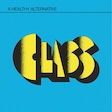 The classic-punk-indebted Class do it the way their forebears did, cranking out a fresh new album each year for the last three years. Maybe there’s not much else to do in Tucson besides write and record music, but that seems like a pretty fine lifestyle if it’s the case. Class continue to hone their attack here, or whatever the opposite of an attack is, as these songs veer closer to the melodic forms of power-pop and new-wave more than any style of punk that eventually morphed into hardcore. The grittier songs remind me of those trustworthy-yet-inexpensive Carpettes singles: too incisive and sneering for a clean new-wave designation, yet too traditionally poppy and “mature” for the spiky punks. A few of these tracks actually remind me of a more AOR version of The Exploding Hearts, singing about interpersonal relationships, work and society, though it’s never too stuffy – check “The Hits Are Here To Stay”, a sort of mission statement that name-checks Stiff Little Fingers, The Outcasts, Protex and Dolly Mixture. A bold move to explicitly list one’s own influences, but Class have the songwriting chops and panache to pull it off, using those quintessential punk-rock building blocks to fashion their own dry desert dwelling.
The classic-punk-indebted Class do it the way their forebears did, cranking out a fresh new album each year for the last three years. Maybe there’s not much else to do in Tucson besides write and record music, but that seems like a pretty fine lifestyle if it’s the case. Class continue to hone their attack here, or whatever the opposite of an attack is, as these songs veer closer to the melodic forms of power-pop and new-wave more than any style of punk that eventually morphed into hardcore. The grittier songs remind me of those trustworthy-yet-inexpensive Carpettes singles: too incisive and sneering for a clean new-wave designation, yet too traditionally poppy and “mature” for the spiky punks. A few of these tracks actually remind me of a more AOR version of The Exploding Hearts, singing about interpersonal relationships, work and society, though it’s never too stuffy – check “The Hits Are Here To Stay”, a sort of mission statement that name-checks Stiff Little Fingers, The Outcasts, Protex and Dolly Mixture. A bold move to explicitly list one’s own influences, but Class have the songwriting chops and panache to pull it off, using those quintessential punk-rock building blocks to fashion their own dry desert dwelling.
Ned Collette Our Other History LP (Sophomore Lounge)
 Sophomore Lounge has really leaned into the beautifully-tender side of indie guitar music over the last year or two, this new full-length from Aussie folk singer Ned Collette exemplifying this tendency. He’s new to me, but a quick internet search reveals an active artist over the last two decades with plenty of releases to his name. Our Other History is no spring-chicken record; this album displays the sort of songwriting chops you’d associate with big-name ’70s folksters who made it their lives, from Laura Nyro to Townes Van Zandt. I had started to think that Sophomore Lounge assigned a pedal-steel to all their artists as a contractual obligation, but amazingly Collette doesn’t have one in the mix here, though it’s the only missing element among pianos, synths, violas, trumpet, double bass and of course some extremely tasteful guitars, both acoustic and electric. Collette’s voice is kind-hearted, soft and sung through his nose, like what you’d expect to emanate from Bernie Sanders’s friend group circa 1972, or if Tom Rapp had a younger brother who ran the college newspaper arts section. Everything is so pristine and mellow that even when the guitars take off on some ECM-jazz-style solos or the synths pulsate with intention, Collette’s living room remains candlelit and with ample seating. The hand percussion of “Shot Through” offers dusk, not daylight, so if you’re without a weighted blanket this winter, Our Other History is a suitable cocoon ready to wrap you up.
Sophomore Lounge has really leaned into the beautifully-tender side of indie guitar music over the last year or two, this new full-length from Aussie folk singer Ned Collette exemplifying this tendency. He’s new to me, but a quick internet search reveals an active artist over the last two decades with plenty of releases to his name. Our Other History is no spring-chicken record; this album displays the sort of songwriting chops you’d associate with big-name ’70s folksters who made it their lives, from Laura Nyro to Townes Van Zandt. I had started to think that Sophomore Lounge assigned a pedal-steel to all their artists as a contractual obligation, but amazingly Collette doesn’t have one in the mix here, though it’s the only missing element among pianos, synths, violas, trumpet, double bass and of course some extremely tasteful guitars, both acoustic and electric. Collette’s voice is kind-hearted, soft and sung through his nose, like what you’d expect to emanate from Bernie Sanders’s friend group circa 1972, or if Tom Rapp had a younger brother who ran the college newspaper arts section. Everything is so pristine and mellow that even when the guitars take off on some ECM-jazz-style solos or the synths pulsate with intention, Collette’s living room remains candlelit and with ample seating. The hand percussion of “Shot Through” offers dusk, not daylight, so if you’re without a weighted blanket this winter, Our Other History is a suitable cocoon ready to wrap you up.
Corker Hallways Of Grey LP (Feel It)
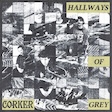 Corker’s debut Falser Truths is barely a year old yet it appears the ice encasing the group has started to thaw on their follow-up, Hallways Of Grey. They’ve still got a chilly demeanor, but edges are smoothed and tempers quelled on this one. The songs carry the energy of early melodic punk (I’m thinking of Dead Boys and DOA) but they’re packaged in dark drapey linens, the skeletal outstretched arms of Ian Curtis subconsciously presiding. To that end, I’m reminded a bit of Poison Ruïn, though Corker are dwellers of the modern American wasteland, not the blood-soaked moors of Albion. Vocalist Luke Corvette (once again, I tip my hat to his name) delivers his vocals in short bursts akin to Total Control’s Daniel Stewart, that technique where the singer firmly and coldly utters only / a couple words / per line / at a time /, just how I did it there. Stewart never seemed to sweat on stage, even when wearing his football scarves, and I’m sure Corvette is fine to forego a shower after the show himself, unless someone is uncouth enough to splash their wine in his direction. They don’t even bust out a synth until the album’s closer, “No Necessities”, clearly having too much fun with their multi-guitar interplay to sit down and program some arpeggios. Recorded on “a family farm in southeastern Indiana in the summer of 2023”, one wonders if the urgency of Hallways Of Grey is the consequence of the group growing tighter and more confident, or simply a desire to wrap it up ASAP and get the hell out of there. Either way works!
Corker’s debut Falser Truths is barely a year old yet it appears the ice encasing the group has started to thaw on their follow-up, Hallways Of Grey. They’ve still got a chilly demeanor, but edges are smoothed and tempers quelled on this one. The songs carry the energy of early melodic punk (I’m thinking of Dead Boys and DOA) but they’re packaged in dark drapey linens, the skeletal outstretched arms of Ian Curtis subconsciously presiding. To that end, I’m reminded a bit of Poison Ruïn, though Corker are dwellers of the modern American wasteland, not the blood-soaked moors of Albion. Vocalist Luke Corvette (once again, I tip my hat to his name) delivers his vocals in short bursts akin to Total Control’s Daniel Stewart, that technique where the singer firmly and coldly utters only / a couple words / per line / at a time /, just how I did it there. Stewart never seemed to sweat on stage, even when wearing his football scarves, and I’m sure Corvette is fine to forego a shower after the show himself, unless someone is uncouth enough to splash their wine in his direction. They don’t even bust out a synth until the album’s closer, “No Necessities”, clearly having too much fun with their multi-guitar interplay to sit down and program some arpeggios. Recorded on “a family farm in southeastern Indiana in the summer of 2023”, one wonders if the urgency of Hallways Of Grey is the consequence of the group growing tighter and more confident, or simply a desire to wrap it up ASAP and get the hell out of there. Either way works!
Disintegration Shiver In A Weak Light LP (Feel It)
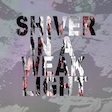 The individual pieces of Disintegration held a lot of exciting possibilities – Noah Anthony of Profligate, Haley Himiko of Pleasure Leftists, Christopher Brown of Cloud Nothings – but their debut Feel It EP delivered soaring goth-wave thrills that surpassed my optimistic expectations. The songs were so good but I wanted more, and now here’s Shiver In A Weak Light, not so much a step forward from the EP as a confirmation of what Disintegration can do, which is whip every other mystique-laden pop/wave act at their own game. Disintegration’s synths are riveting and conspicuous, as thrilling and nearly as scary as hearing Skinny Puppy for the first time; the vocals of Haley Himiko burst with emotion and confidence, like an American Björk out for blood. (I can only assume Linkin Park asked her to join before they hired that Scientologist, because if not, they need to fire their management immediately.) Their songs are technically dazzling if that’s a quality you’re into, and while I suppose I am to some extent, it’s the widescreen hooks and big sweaty aliveness of Disintegration’s music that grabs me over and over (“Hideaway” provides a particularly potent rush). They don’t really repeat themselves – you’ll only find a wilin’ out extended guitar solo on “Messages”, for example – but the sound they’ve crafted is already distinctly Disintegration, through and through. Kinda wish for their sakes that they could’ve landed this record on a more goth-pandering label, seeing how (dorkily) huge that audience is these days… if that crowd wants their next Boy Harsher or Sextile or Cold Cave or whatever, Disintegration is doing something as catchy and energetic as the cream of that crop yet substantive in its own unique way. Rather than focusing on latex photoshoots, black-and-white stylized Instagram posting or endless vinyl “colorway” variants, they let their music do the talking, which probably means fame and fortune aren’t in their sights but rather a dedicated following of true freaks like me and you.
The individual pieces of Disintegration held a lot of exciting possibilities – Noah Anthony of Profligate, Haley Himiko of Pleasure Leftists, Christopher Brown of Cloud Nothings – but their debut Feel It EP delivered soaring goth-wave thrills that surpassed my optimistic expectations. The songs were so good but I wanted more, and now here’s Shiver In A Weak Light, not so much a step forward from the EP as a confirmation of what Disintegration can do, which is whip every other mystique-laden pop/wave act at their own game. Disintegration’s synths are riveting and conspicuous, as thrilling and nearly as scary as hearing Skinny Puppy for the first time; the vocals of Haley Himiko burst with emotion and confidence, like an American Björk out for blood. (I can only assume Linkin Park asked her to join before they hired that Scientologist, because if not, they need to fire their management immediately.) Their songs are technically dazzling if that’s a quality you’re into, and while I suppose I am to some extent, it’s the widescreen hooks and big sweaty aliveness of Disintegration’s music that grabs me over and over (“Hideaway” provides a particularly potent rush). They don’t really repeat themselves – you’ll only find a wilin’ out extended guitar solo on “Messages”, for example – but the sound they’ve crafted is already distinctly Disintegration, through and through. Kinda wish for their sakes that they could’ve landed this record on a more goth-pandering label, seeing how (dorkily) huge that audience is these days… if that crowd wants their next Boy Harsher or Sextile or Cold Cave or whatever, Disintegration is doing something as catchy and energetic as the cream of that crop yet substantive in its own unique way. Rather than focusing on latex photoshoots, black-and-white stylized Instagram posting or endless vinyl “colorway” variants, they let their music do the talking, which probably means fame and fortune aren’t in their sights but rather a dedicated following of true freaks like me and you.
Faux Départ Faux Départ 7″ (Hidden Bay / Tranzophobia / Mutant / Andalucia Über Alles / Tocsin / Rollmops)
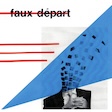 Through years of writing these reviews, I’ve noticed that punk records that take five or more labels to collaboratively release them has become a red flag. If everyone is only willing or able to chip in a couple hundred bucks, does anyone really fully believe in the project or feel invested in its success? Of course, it could swing the other way and be that lots of labels are hungry to get their name attached to something great, which I’d guess is a more likely case for this seven-inch EP from Lyon, France’s Faux Départ. They balance a classic tuneful Euro punk style with modern urgency, and they do so without settling into a sonic cul-de-sac. Opener “Si Tu Disparais” could be confused with Royal Headache before the gruff (and vastly more French) vocals kick in; “Drone” is mod-ish punk in line with 999 and The Ruts. “Anti-France” is practically hardcore, a strained circle-pit of a song that summons the French discontent (replete with sounds of street violence and smashed windows) in the grand tradition of renouncing one’s home country, and before I can dust the broken glass off my shoulders, “Toujours Là” whips up a Vibrators-level pogo fest to wrap it up. How many touring bands have made it through Lyon, feeling tired and ready to phone one in, only to witness Faux Départ’s frenzied opening set of high-energy, formally-inspired punk and realize they have to bring their A game?
Through years of writing these reviews, I’ve noticed that punk records that take five or more labels to collaboratively release them has become a red flag. If everyone is only willing or able to chip in a couple hundred bucks, does anyone really fully believe in the project or feel invested in its success? Of course, it could swing the other way and be that lots of labels are hungry to get their name attached to something great, which I’d guess is a more likely case for this seven-inch EP from Lyon, France’s Faux Départ. They balance a classic tuneful Euro punk style with modern urgency, and they do so without settling into a sonic cul-de-sac. Opener “Si Tu Disparais” could be confused with Royal Headache before the gruff (and vastly more French) vocals kick in; “Drone” is mod-ish punk in line with 999 and The Ruts. “Anti-France” is practically hardcore, a strained circle-pit of a song that summons the French discontent (replete with sounds of street violence and smashed windows) in the grand tradition of renouncing one’s home country, and before I can dust the broken glass off my shoulders, “Toujours Là” whips up a Vibrators-level pogo fest to wrap it up. How many touring bands have made it through Lyon, feeling tired and ready to phone one in, only to witness Faux Départ’s frenzied opening set of high-energy, formally-inspired punk and realize they have to bring their A game?
Gong Gong Gong 工工工 & Mong Tong Mongkok Duel LP (Rose Mansion Analog)
 Beijing’s Gong Gong Gong 工工工 team up with Taiwanese duo Mong Tong for the finest post-hippie motorik you’ll enjoy this year. Gong Gong Gong 工工工’s Tom Ng was in The Offset:Spectacles, whose sole album remains a high water mark for avant-rock in the 2010s (and you can still pick up the Trouble In Mind reissue for cheap!), and he sort of filtered that sound down even further with Gong Gong Gong 工工工, bolstered here with the swinging psychedelia of Mong Tong. Really, it sounds like a true-to-form minimalist reduction of Agitation Free and Can in instrumental street-walker modes, a reassessment of heady rock units via diminishing the conflicting elements until they’re pared down to cyclical rhythms, guitars that pluck and scrape in equal measure and bass guitar that’s happiest when it’s only playing one note. The recording is crisp and alive, which makes sense as it was put to tape in a Hong Kong studio that still uses their original late ’70s gear, giving it that authentic vintage feel without the trappings of phony, glossy nostalgia. It’s honestly wild to me how excellent Mongkok Duel is! Feels like I’m communing with the spirits of Lou Reed, Speed, Glue & Shinki, Link Wray, Tetuzi Akiyama and Guru Guru in a corduroy conversation pit thick with incense when I throw on Mongkok Duel, which it turns out is practically every day.
Beijing’s Gong Gong Gong 工工工 team up with Taiwanese duo Mong Tong for the finest post-hippie motorik you’ll enjoy this year. Gong Gong Gong 工工工’s Tom Ng was in The Offset:Spectacles, whose sole album remains a high water mark for avant-rock in the 2010s (and you can still pick up the Trouble In Mind reissue for cheap!), and he sort of filtered that sound down even further with Gong Gong Gong 工工工, bolstered here with the swinging psychedelia of Mong Tong. Really, it sounds like a true-to-form minimalist reduction of Agitation Free and Can in instrumental street-walker modes, a reassessment of heady rock units via diminishing the conflicting elements until they’re pared down to cyclical rhythms, guitars that pluck and scrape in equal measure and bass guitar that’s happiest when it’s only playing one note. The recording is crisp and alive, which makes sense as it was put to tape in a Hong Kong studio that still uses their original late ’70s gear, giving it that authentic vintage feel without the trappings of phony, glossy nostalgia. It’s honestly wild to me how excellent Mongkok Duel is! Feels like I’m communing with the spirits of Lou Reed, Speed, Glue & Shinki, Link Wray, Tetuzi Akiyama and Guru Guru in a corduroy conversation pit thick with incense when I throw on Mongkok Duel, which it turns out is practically every day.
Will Long Behind The Times 12″ (no label)
 If techno was a digestible ingredient, it’d be something like flour: a fundamental substance that, depending what it’s mixed with, can create an endless number of wildly disparate results. The Japan-based American producer Will Long takes those basic techno building blocks – digital clicks and claps, a 4/4 kick, humming chords – and stretches the dough so wide and thin as to be nearly translucent. “Behind The Times” feels like early ’00s vintage Omar S, with the least possible drums needed to keep a tech-y house groove in order and chords that change more infrequently than even the most monotonous alt-shoegaze group. On one hand, it’s extremely boring, and on the other, it’s downright transcendent because it’s so outwardly boring like that, not even remotely try to make something of itself. “Behind The Times (Bassline Mixx)” is the flip, opening with a modulated analog arpeggio that is practically technicolor in comparison to the original’s greyscale mix, though just as sparsely populated. It hearkens to work by Legowelt and Kyle Hall, producers who would not be first described as “people pleasing”, but even they might throw a little something extra in the mix. Will Long, an American living over there in Tokyo, is clearly unbound by any dance-floor-minded mandates, and I think I love him for it.
If techno was a digestible ingredient, it’d be something like flour: a fundamental substance that, depending what it’s mixed with, can create an endless number of wildly disparate results. The Japan-based American producer Will Long takes those basic techno building blocks – digital clicks and claps, a 4/4 kick, humming chords – and stretches the dough so wide and thin as to be nearly translucent. “Behind The Times” feels like early ’00s vintage Omar S, with the least possible drums needed to keep a tech-y house groove in order and chords that change more infrequently than even the most monotonous alt-shoegaze group. On one hand, it’s extremely boring, and on the other, it’s downright transcendent because it’s so outwardly boring like that, not even remotely try to make something of itself. “Behind The Times (Bassline Mixx)” is the flip, opening with a modulated analog arpeggio that is practically technicolor in comparison to the original’s greyscale mix, though just as sparsely populated. It hearkens to work by Legowelt and Kyle Hall, producers who would not be first described as “people pleasing”, but even they might throw a little something extra in the mix. Will Long, an American living over there in Tokyo, is clearly unbound by any dance-floor-minded mandates, and I think I love him for it.
Lasse Marhaug Provoke LP (Smalltown Supersound)
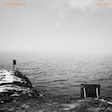 We’ve all got ’em: names we’ve seen around for years and yet, for one reason or another, never really checked out. Lasse Marhaug is one of those for me, a respected mover and shaker in the realm of noise since the ’90s, and while I own at least a split seven-inch or two, I can’t say I’ve ever sat down for a serious session with his music. He’s been doing this zine called Personal Best for a few years now, of which I am a massive fan – his interviews are so deep yet approachable, the whole enterprise clearly driven by his passion for music and art and creativity and exploration, and I have become such a fan of him the person that it felt like it was time to hear what he’s been up to sonically, coincidentally right as Provoke hit the shelves. I kind of always assumed his was a brutalist form of laptop noise, and while that is probably both right and wrong, that’s what I’m getting here. It’s… fine? Crumbly distortions, crinkling high-end and massive granite slabs of bass are deployed in steady, patient ways, much too active to be filed under drone but too stoic and academic to really feel like industrial. It all feels very laptoppy, for better or worse. Not as bone-crushing as Emptyset, not as cinematic as Ben Frost, not as groundbreaking as Phil Niblock… just a nice set of textured electronic elements drifting between each other, sometimes plunging through the depths, sometimes whispering through the trees. While perfectly alright, nothing on Provoke really provokes me in any way, except to say that if you are sitting on any early back issues of Personal Best and want to unload them, let’s work out a trade. It’s the best.
We’ve all got ’em: names we’ve seen around for years and yet, for one reason or another, never really checked out. Lasse Marhaug is one of those for me, a respected mover and shaker in the realm of noise since the ’90s, and while I own at least a split seven-inch or two, I can’t say I’ve ever sat down for a serious session with his music. He’s been doing this zine called Personal Best for a few years now, of which I am a massive fan – his interviews are so deep yet approachable, the whole enterprise clearly driven by his passion for music and art and creativity and exploration, and I have become such a fan of him the person that it felt like it was time to hear what he’s been up to sonically, coincidentally right as Provoke hit the shelves. I kind of always assumed his was a brutalist form of laptop noise, and while that is probably both right and wrong, that’s what I’m getting here. It’s… fine? Crumbly distortions, crinkling high-end and massive granite slabs of bass are deployed in steady, patient ways, much too active to be filed under drone but too stoic and academic to really feel like industrial. It all feels very laptoppy, for better or worse. Not as bone-crushing as Emptyset, not as cinematic as Ben Frost, not as groundbreaking as Phil Niblock… just a nice set of textured electronic elements drifting between each other, sometimes plunging through the depths, sometimes whispering through the trees. While perfectly alright, nothing on Provoke really provokes me in any way, except to say that if you are sitting on any early back issues of Personal Best and want to unload them, let’s work out a trade. It’s the best.
Moin You Never End LP (AD 93)
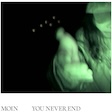 If you liken dollar-bin ’90s emo records (or at least records that up until recently were in the dollar-bin) to a Salvation Army thrift shop, Moin’s music is by comparison the expensive center-city boutique that offers street-wear versions of vintage tees at knowingly-exorbitant prices. Coming from the electronic/experimental scenes that thrive in London, Moin (the duo of Raime alongside extraordinary percussionist Valentina Magaletti) are shining up their pensive emo-core with a fresh forward-minded aesthetic; their fascinating and unusual perspective continues to sharpen here. You Never End is the group’s third full-length since 2020, and it features a host of guest vocalists, one of the hottest current trends on the streaming music circuit (a cynical trick to enhance one’s online engagement perhaps?), though I believe that Moin’s intentions are artistically pure. Or, at the very least, these songs are great, and all the more interesting thanks to the distracted sprechsgang of Sophia Al-Maria, Coby Sey’s moody spoken-word presiding over pitch-lowered vocal samples, and Olan Monk on what is clearly the hit single, “Guess It’s Wrecked”. Monk’s soothing bellow hits like Fish Narc if he grew up in Brixton, and the track is up there with King Krule’s guest-spot on Mount Kimbie’s “Blue Train Lines” as far as painfully hip contemporary UK post-punk-tronica is concerned. The Moin players are up to some strange new riff-lands on “Anything But Sopo” and “We Know What Gives”, rightfully unafraid of the “math rock” tag as they know how to integrate intricate and unfamiliar patterns in their ultra-stylized world of reductionist grey-skied emo. It’s exquisitely tailored music, which is a funny way to approach a style well-known for its overt messiness, yet there’s a lot of life in these old sounds when approached from Moin’s entirely new angles, much like an old Raymond Pettibon-drawn punk flyer screened onto a Supreme x The North Face collaborative puffer jacket.
If you liken dollar-bin ’90s emo records (or at least records that up until recently were in the dollar-bin) to a Salvation Army thrift shop, Moin’s music is by comparison the expensive center-city boutique that offers street-wear versions of vintage tees at knowingly-exorbitant prices. Coming from the electronic/experimental scenes that thrive in London, Moin (the duo of Raime alongside extraordinary percussionist Valentina Magaletti) are shining up their pensive emo-core with a fresh forward-minded aesthetic; their fascinating and unusual perspective continues to sharpen here. You Never End is the group’s third full-length since 2020, and it features a host of guest vocalists, one of the hottest current trends on the streaming music circuit (a cynical trick to enhance one’s online engagement perhaps?), though I believe that Moin’s intentions are artistically pure. Or, at the very least, these songs are great, and all the more interesting thanks to the distracted sprechsgang of Sophia Al-Maria, Coby Sey’s moody spoken-word presiding over pitch-lowered vocal samples, and Olan Monk on what is clearly the hit single, “Guess It’s Wrecked”. Monk’s soothing bellow hits like Fish Narc if he grew up in Brixton, and the track is up there with King Krule’s guest-spot on Mount Kimbie’s “Blue Train Lines” as far as painfully hip contemporary UK post-punk-tronica is concerned. The Moin players are up to some strange new riff-lands on “Anything But Sopo” and “We Know What Gives”, rightfully unafraid of the “math rock” tag as they know how to integrate intricate and unfamiliar patterns in their ultra-stylized world of reductionist grey-skied emo. It’s exquisitely tailored music, which is a funny way to approach a style well-known for its overt messiness, yet there’s a lot of life in these old sounds when approached from Moin’s entirely new angles, much like an old Raymond Pettibon-drawn punk flyer screened onto a Supreme x The North Face collaborative puffer jacket.
Nusidm Manifesto Stick LP (no label)
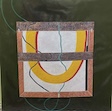 Always a keen limits-pusher, Brisbane’s Glen Schenau has truly gone overboard with Manifesto Stick. The head-scratching details pile up quickly: an LP limited to a scant fifty copies, all with a big thick booklet attached by green wire to the cover and a corresponding Bandcamp page that features digital files of music that do not match the vinyl, but instead are the same clinking piano loop over and over (which, I believe, does actually appear on the record at some point). That’s enough crazy for one release, but I thumbed through the booklet, and my god, Schenau handwrote dozens of pages in his distinctive illegible earthquake font. I can’t imagine how much time he spent, writing out this thick packet of unreadable prose, not in some wild scribbly mess but a clearly rigid artistic practice, his lettering maintaining its design throughout. Unnerving! Musically, while Nusidm fits not entirely cleanly within the realm of neo-no-wave post-punk, Manifesto Stick is mostly an instrumental affair, full of jagged sound-effects, digitally-enhanced dub versions of daily errands, basement rhythms and direct-to-iPhone clatter. There’s a piano getting punched, some undistorted guitar strumming along to what sounds like a broken washing machine… just a wild concoction of sounds designed to permanently stain on contact. It’s an entertainingly abstract addition to the world of Nusidm, but man, that preposterous booklet… it really got me good.
Always a keen limits-pusher, Brisbane’s Glen Schenau has truly gone overboard with Manifesto Stick. The head-scratching details pile up quickly: an LP limited to a scant fifty copies, all with a big thick booklet attached by green wire to the cover and a corresponding Bandcamp page that features digital files of music that do not match the vinyl, but instead are the same clinking piano loop over and over (which, I believe, does actually appear on the record at some point). That’s enough crazy for one release, but I thumbed through the booklet, and my god, Schenau handwrote dozens of pages in his distinctive illegible earthquake font. I can’t imagine how much time he spent, writing out this thick packet of unreadable prose, not in some wild scribbly mess but a clearly rigid artistic practice, his lettering maintaining its design throughout. Unnerving! Musically, while Nusidm fits not entirely cleanly within the realm of neo-no-wave post-punk, Manifesto Stick is mostly an instrumental affair, full of jagged sound-effects, digitally-enhanced dub versions of daily errands, basement rhythms and direct-to-iPhone clatter. There’s a piano getting punched, some undistorted guitar strumming along to what sounds like a broken washing machine… just a wild concoction of sounds designed to permanently stain on contact. It’s an entertainingly abstract addition to the world of Nusidm, but man, that preposterous booklet… it really got me good.
Objekt Chicken Garaage 12″ (Kapsela)
 Lots of press about Objekt’s big “return” with his new label Kapsela, but Objekt never left the spotlight here at Yellow Green Red headquarters. 2022’s Objekt #5 and 2018’s Cocoon Crush are two of the finest examples of modern electronic music’s knack for being as meticulously devised as physically controlling, so it was a given that I’d check out this new two-track twelve-inch with a big smudgy Life-Saver / cat anus / petunia on the cover. With a title like “Chicken Garaage”, you’d think Objekt is open to having at least a little silly fun, and from the way the ticklish bass-line speeds on past, that seems to be the case. It’s certainly more of an upbeat party-favor than I’m used to hearing from Objekt, closer to Hessle Audio labelmates Joe and Untold in that 2014 post-dubstep mindset rather than any of the dissected post-modern experiments of his PAN brethren, but it doesn’t not fit into Objekt’s universe. Interestingly, the notes state that this is one of his least-edited cuts, a mere fifty-five versions until we landed at this final mix. I kinda wish this data was accessible for all music – how many different variants of Flipper’s “Ha Ha Ha” or Tullio De Piscopo’s “Stop Bajon” existed prior to the final recorded ones? “Worm Dance” is the b-side here, and it has more of that liquid-steel sound-design I’d expect from contemporary Objekt, even if the beat itself kind of recedes into the hyperactive atmosphere. Not a dramatic reinvention or bold step forward, but a welcome addition nonetheless.
Lots of press about Objekt’s big “return” with his new label Kapsela, but Objekt never left the spotlight here at Yellow Green Red headquarters. 2022’s Objekt #5 and 2018’s Cocoon Crush are two of the finest examples of modern electronic music’s knack for being as meticulously devised as physically controlling, so it was a given that I’d check out this new two-track twelve-inch with a big smudgy Life-Saver / cat anus / petunia on the cover. With a title like “Chicken Garaage”, you’d think Objekt is open to having at least a little silly fun, and from the way the ticklish bass-line speeds on past, that seems to be the case. It’s certainly more of an upbeat party-favor than I’m used to hearing from Objekt, closer to Hessle Audio labelmates Joe and Untold in that 2014 post-dubstep mindset rather than any of the dissected post-modern experiments of his PAN brethren, but it doesn’t not fit into Objekt’s universe. Interestingly, the notes state that this is one of his least-edited cuts, a mere fifty-five versions until we landed at this final mix. I kinda wish this data was accessible for all music – how many different variants of Flipper’s “Ha Ha Ha” or Tullio De Piscopo’s “Stop Bajon” existed prior to the final recorded ones? “Worm Dance” is the b-side here, and it has more of that liquid-steel sound-design I’d expect from contemporary Objekt, even if the beat itself kind of recedes into the hyperactive atmosphere. Not a dramatic reinvention or bold step forward, but a welcome addition nonetheless.
Oïmiakon Comptoir Des Vanités LP (Bruit Direct)
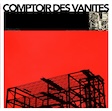 Bruit Direct is a fun label to follow for the simple fact that the only obvious thread between releases is the eclectic taste of the guy who runs it (who also happens to be named Guy, which makes it easy for me to remember). The last couple Bruit Direct releases featured poppy guitars in universally-palatable forms, but this full-length from Parisian artist Oïmiakon lays out an entirely different musical spectrum, far from the any essence that could be construed as pop. The world of Comptoir Des Vanités bursts with bulky electronic machinery that generates tones, pulses, frequencies and rhythms, a prehistoric techno of sorts. On the more playful tracks, I’m reminded of Felix Kubin’s early modular experiments, electronic new-wave music built by nerds for the pleasure of their machines, but more often the music is insular and cryptically-defined, very much in line with the fearless roster of Vanity Records. Even when a 4/4 thump appears, it never feels like dance music… these tracks seem to function mostly for themselves, overlapping processes passing each other on modified circuit boards. I don’t want to make it sound like a matter of entirely unplanned coincidence, though – Philémon Girouard, the sole operator of Oïmakon, knows how to tell a story with his gear, be it one of unmanned submarines bonking into each other or space-station control centers warning of thermonuclear disturbances.
Bruit Direct is a fun label to follow for the simple fact that the only obvious thread between releases is the eclectic taste of the guy who runs it (who also happens to be named Guy, which makes it easy for me to remember). The last couple Bruit Direct releases featured poppy guitars in universally-palatable forms, but this full-length from Parisian artist Oïmiakon lays out an entirely different musical spectrum, far from the any essence that could be construed as pop. The world of Comptoir Des Vanités bursts with bulky electronic machinery that generates tones, pulses, frequencies and rhythms, a prehistoric techno of sorts. On the more playful tracks, I’m reminded of Felix Kubin’s early modular experiments, electronic new-wave music built by nerds for the pleasure of their machines, but more often the music is insular and cryptically-defined, very much in line with the fearless roster of Vanity Records. Even when a 4/4 thump appears, it never feels like dance music… these tracks seem to function mostly for themselves, overlapping processes passing each other on modified circuit boards. I don’t want to make it sound like a matter of entirely unplanned coincidence, though – Philémon Girouard, the sole operator of Oïmakon, knows how to tell a story with his gear, be it one of unmanned submarines bonking into each other or space-station control centers warning of thermonuclear disturbances.
Patois Counselors Limited Sphere LP (Ever/Never)
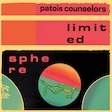 On their third full-length, we find our ‘Counselors beleaguered and seasoned, maybe a little resigned but not entirely without hope. Who can’t relate to that? Proper Release, Patois Counselors’ debut, was my favorite album of 2018 (which, it should go without saying, is an extremely big deal), and while that early version of the group bounced and bopped like college freshmen too smart for their own good, Limited Sphere operates on low-battery mode by comparison. It took me a minute for me to get acclimated to its many laid-back tunes, but this was never a band that was going to tread in circles – they always had too many ideas, too much to explore and too many ways, via a cadre of auxiliary band members, to make it a reality. There’s still plenty of bounce to Limited Sphere – “Serious Rider” lets drummer Taylor Knox go full Kid Millions-mode behind the kit, for example – but the album’s relative softness, even in its more rollicking moments, is notable. “Marge Attack” finds a groove somewhere between Cake and Parquet Courts, but they simmer it, even going so far as to enhance the catchy chorus with woodwinds straight from an early Disney movie. “Bands I Barely Spoke With” might sound snide from the title, but it’s actually a tender ode to being in bands that the vast majority of the world will never know, let alone care about. Bandleader Bo White might’ve been able to assemble these songs by himself if he had to, but the rich, seven-person-deep community of Patois Counselors is indispensable for the group’s sound, full of moving parts and conflicting textures that thrive no matter the tempo or disposition.
On their third full-length, we find our ‘Counselors beleaguered and seasoned, maybe a little resigned but not entirely without hope. Who can’t relate to that? Proper Release, Patois Counselors’ debut, was my favorite album of 2018 (which, it should go without saying, is an extremely big deal), and while that early version of the group bounced and bopped like college freshmen too smart for their own good, Limited Sphere operates on low-battery mode by comparison. It took me a minute for me to get acclimated to its many laid-back tunes, but this was never a band that was going to tread in circles – they always had too many ideas, too much to explore and too many ways, via a cadre of auxiliary band members, to make it a reality. There’s still plenty of bounce to Limited Sphere – “Serious Rider” lets drummer Taylor Knox go full Kid Millions-mode behind the kit, for example – but the album’s relative softness, even in its more rollicking moments, is notable. “Marge Attack” finds a groove somewhere between Cake and Parquet Courts, but they simmer it, even going so far as to enhance the catchy chorus with woodwinds straight from an early Disney movie. “Bands I Barely Spoke With” might sound snide from the title, but it’s actually a tender ode to being in bands that the vast majority of the world will never know, let alone care about. Bandleader Bo White might’ve been able to assemble these songs by himself if he had to, but the rich, seven-person-deep community of Patois Counselors is indispensable for the group’s sound, full of moving parts and conflicting textures that thrive no matter the tempo or disposition.
Poem Rocket Lend-Lease 12″ (Silver Girl)
 As new bands continue to excavate every last scrap of the ’90s for ideas to rip-off and random parts to sell for scrap, it’s a good thing there’s so damn much of it! I was an enthusiastic fan of music back then, particularly of the alt-rock world and the underground beneath it, yet I had no idea Poem Rocket existed until now, even as I see that they released four full-lengths back in the day, two of which came out on the respected Atavistic label. I don’t think they’re back together now – and I will respect them more if they’re one of the few old bands that don’t reunite – as the four songs of Lend-Lease were recorded in 1999 and shelved for reasons I refuse to investigate. What’s interesting is that this EP could be confused for the work of a contemporary band, the way in which they fuse the odd melodic phrasings of Sonic Youth with baggy-jean alt-shoegaze guitars, layered and atmospheric production (they open “Black Freighter Contraband” with ocean sounds, because why not) and a simmering sense of inner-city psychedelia (before the “desert rock” phenomenon took over as the standard psych-rock aesthetic). Poem Rocket hit that weird spot where their music seems to come from an emotional place, and is clearly underground, yet it has absolutely nothing to do with any form of emo; the aforementioned “Black Freighter Contraband” is closer to acoustic Led Zep than American Football or The Hated. It’s weird in a non-performative way, back when the built-in internet-genre fanbase didn’t exist, right down to Silver Girl’s presentation of these four songs: a clear-vinyl twelve-inch gatefold record with accompanying twenty-page(!) glossy booklet.
As new bands continue to excavate every last scrap of the ’90s for ideas to rip-off and random parts to sell for scrap, it’s a good thing there’s so damn much of it! I was an enthusiastic fan of music back then, particularly of the alt-rock world and the underground beneath it, yet I had no idea Poem Rocket existed until now, even as I see that they released four full-lengths back in the day, two of which came out on the respected Atavistic label. I don’t think they’re back together now – and I will respect them more if they’re one of the few old bands that don’t reunite – as the four songs of Lend-Lease were recorded in 1999 and shelved for reasons I refuse to investigate. What’s interesting is that this EP could be confused for the work of a contemporary band, the way in which they fuse the odd melodic phrasings of Sonic Youth with baggy-jean alt-shoegaze guitars, layered and atmospheric production (they open “Black Freighter Contraband” with ocean sounds, because why not) and a simmering sense of inner-city psychedelia (before the “desert rock” phenomenon took over as the standard psych-rock aesthetic). Poem Rocket hit that weird spot where their music seems to come from an emotional place, and is clearly underground, yet it has absolutely nothing to do with any form of emo; the aforementioned “Black Freighter Contraband” is closer to acoustic Led Zep than American Football or The Hated. It’s weird in a non-performative way, back when the built-in internet-genre fanbase didn’t exist, right down to Silver Girl’s presentation of these four songs: a clear-vinyl twelve-inch gatefold record with accompanying twenty-page(!) glossy booklet.
Private Hell Wake Up Screaming / Dead Inside 7″ flexi (no label)
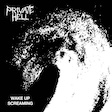 Forty-four years ago, DOA woke up screaming on their debut EP, and now Richmond’s Private Hell are encountering the same troubled somnolence. Has our society learned nothing? It would certainly seem that way lately, but at least there are still angry punks making it the central focus of their ire. “Wake Up Screaming” pounds with the relentless heaviness of Swedish-style d-beat, but the metallic guitar leads lend the proceedings a thrash-metal spin. Not an unprecedented combo, metallic guitars with a heavy hardcore-inspired rhythm section, but Private Hell are confident enough in their attack that it still resonates. “Dead Inside” quickly follows with a robust breakdown before the pace reaches new frantic heights – they even take it to a blast-beat for a half-measure in there! I’m sure these guys grew up going to Pig Destroyer and Full Of Hell shows, as they seem to realize that technicality is a helpful tool for properly imparting one’s sonic brutality, but it ultimately comes down to how hard a band is willing to play, the understanding that the music should extract a pound of your flesh one way or another if done right. These two songs might be an insufficient data sample to pull from, but I’m willing to go out on a limb and say that Private Hell play pretty damn hard.
Forty-four years ago, DOA woke up screaming on their debut EP, and now Richmond’s Private Hell are encountering the same troubled somnolence. Has our society learned nothing? It would certainly seem that way lately, but at least there are still angry punks making it the central focus of their ire. “Wake Up Screaming” pounds with the relentless heaviness of Swedish-style d-beat, but the metallic guitar leads lend the proceedings a thrash-metal spin. Not an unprecedented combo, metallic guitars with a heavy hardcore-inspired rhythm section, but Private Hell are confident enough in their attack that it still resonates. “Dead Inside” quickly follows with a robust breakdown before the pace reaches new frantic heights – they even take it to a blast-beat for a half-measure in there! I’m sure these guys grew up going to Pig Destroyer and Full Of Hell shows, as they seem to realize that technicality is a helpful tool for properly imparting one’s sonic brutality, but it ultimately comes down to how hard a band is willing to play, the understanding that the music should extract a pound of your flesh one way or another if done right. These two songs might be an insufficient data sample to pull from, but I’m willing to go out on a limb and say that Private Hell play pretty damn hard.
Rearranged Face Far Green Arcade LP (Tomothy)
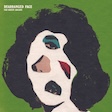 LA’s Rearranged Face take me back to that freewheelin’ time when The Rapture were still playing basements but clearly bound for more, when dance-punk bands shared bills with youth-crew hardcore and Fugazi clones and it didn’t make sense but it also made perfect sense. One might attempt to attach the egg-punk designation to Rearranged Face’s sound, though to my ears the only eggs involved would’ve been the ones hurled at The Locust’s tour van outside of Wilkes-Barre Fest in 1999. Rearranged Face are scrappy and fun, dance-punk that avoids the typical disco beat entirely and isn’t afraid to push the big red buttons on a Nintendo-sounding synth, all with a singer who yelps like he’s being accidentally asphyxiated by his skinny tie. I suppose I’m leaning hard on the nostalgia vibe with this review, but Far Green Arcade isn’t merely another trip down memory lane – this music is alive and fresh, ready to climb up onto today’s amps and smack its head on the drop ceiling. I’d file them alongside other ragtag modern troupes indebted to the punker side of no-wave, groups like Collate and Neutrals, though Rearranged Face sass me in a way that the Numbers / Emergency split LP did back when I had my own mop of hair with bangs cut out the front. It was, and remains, an excellent look!
LA’s Rearranged Face take me back to that freewheelin’ time when The Rapture were still playing basements but clearly bound for more, when dance-punk bands shared bills with youth-crew hardcore and Fugazi clones and it didn’t make sense but it also made perfect sense. One might attempt to attach the egg-punk designation to Rearranged Face’s sound, though to my ears the only eggs involved would’ve been the ones hurled at The Locust’s tour van outside of Wilkes-Barre Fest in 1999. Rearranged Face are scrappy and fun, dance-punk that avoids the typical disco beat entirely and isn’t afraid to push the big red buttons on a Nintendo-sounding synth, all with a singer who yelps like he’s being accidentally asphyxiated by his skinny tie. I suppose I’m leaning hard on the nostalgia vibe with this review, but Far Green Arcade isn’t merely another trip down memory lane – this music is alive and fresh, ready to climb up onto today’s amps and smack its head on the drop ceiling. I’d file them alongside other ragtag modern troupes indebted to the punker side of no-wave, groups like Collate and Neutrals, though Rearranged Face sass me in a way that the Numbers / Emergency split LP did back when I had my own mop of hair with bangs cut out the front. It was, and remains, an excellent look!
Rusted Shut Early Years, Vol. 2 LP (Tall Texan)
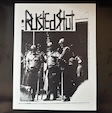 Rusted Shut played what was advertised as their final show earlier this year, an accomplishment that the group’s remaining members surely couldn’t have foreseen. This was always a band built on drugs, dysfunction, antagonism and chaos both personally and musically, and the fact that they were able to be the ones to pull the plug on it, over thirty years later, is a testament to Rusted Shut’s stubborn refusal to perish. Of course, some band members did in fact depart this mortal coil since the group’s late ’80s origins, and in light of this fact, Tall Texan sharted out this appropriately bare-bones twelve-inch LP composed of tracks recorded between 1992 and 1995. It’s startling how Rusted Shut has always sounded like Rusted Shut, completely out of step with the various musical trends, underground or otherwise, in the ’90s. Their nihilistic dirge-punk, recorded with all the filth that low-fidelity has to offer, took the Drunks With Guns ethos and dug it an even deeper grave, mud-soaked riffs that sound as painful for the group as they are for the listener. Their aesthetic was fully formed by The Year That Punk Broke, and the few daring seekers of plodding, molten noise-punk were rewarded thusly upon its discovery. As a vinyl record, Early Years, Vol. 2 is a worthy time-capsule, but at this point, with my personal shelves stocked up with Rusted Shut albums, what I want is a book: can someone close to the group put their story to the long-form written word, please? As written in large letters on the insert here, they’ve already got the perfect title ready to go: “Entertain No One”.
Rusted Shut played what was advertised as their final show earlier this year, an accomplishment that the group’s remaining members surely couldn’t have foreseen. This was always a band built on drugs, dysfunction, antagonism and chaos both personally and musically, and the fact that they were able to be the ones to pull the plug on it, over thirty years later, is a testament to Rusted Shut’s stubborn refusal to perish. Of course, some band members did in fact depart this mortal coil since the group’s late ’80s origins, and in light of this fact, Tall Texan sharted out this appropriately bare-bones twelve-inch LP composed of tracks recorded between 1992 and 1995. It’s startling how Rusted Shut has always sounded like Rusted Shut, completely out of step with the various musical trends, underground or otherwise, in the ’90s. Their nihilistic dirge-punk, recorded with all the filth that low-fidelity has to offer, took the Drunks With Guns ethos and dug it an even deeper grave, mud-soaked riffs that sound as painful for the group as they are for the listener. Their aesthetic was fully formed by The Year That Punk Broke, and the few daring seekers of plodding, molten noise-punk were rewarded thusly upon its discovery. As a vinyl record, Early Years, Vol. 2 is a worthy time-capsule, but at this point, with my personal shelves stocked up with Rusted Shut albums, what I want is a book: can someone close to the group put their story to the long-form written word, please? As written in large letters on the insert here, they’ve already got the perfect title ready to go: “Entertain No One”.
Shed Applications 12″ (Ilian Tape)
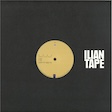 The pairing of Munich’s Ilian Tape label and Berlin’s Shed is as natural as bier in a garten, but it hadn’t happened… until now. Ilian Tape has been working overtime pumping out stately and expressive European techno sides in recent years, and we all know Shed hasn’t slept in the last two decades, so while it may seem like an inevitability that the two forces would someday link up, it doesn’t make Applications any less potent. These three tracks are durable yet spongy, like all excellent Shed material smacking the percussive elements front and center. The chest-rattling kicks are immediate and potent in a way that only Germans with aerodynamic haircuts can do it, but in true Shed fashion, its the synth leads that will have your head swiveling in double time. “TLSQ” is a prime example, a galloping thud met by a frantic swirl of illumination; I’m afraid time might stand still if I turn off the lights and crank it loud enough. “UFO2” is somehow even heavier, toms the size of monster-truck tires hammering out a trance-y beat as warning sirens demand that your soul separate from your body if only for its seven-minute duration. Shed probably cranks out tracks this sturdy and menacing the way you or I might complete a crossword puzzle over morning coffee, only half paying attention, but that doesn’t detract from the thrilling techno muscularity displayed on this twelve-inch, formal yet fierce.
The pairing of Munich’s Ilian Tape label and Berlin’s Shed is as natural as bier in a garten, but it hadn’t happened… until now. Ilian Tape has been working overtime pumping out stately and expressive European techno sides in recent years, and we all know Shed hasn’t slept in the last two decades, so while it may seem like an inevitability that the two forces would someday link up, it doesn’t make Applications any less potent. These three tracks are durable yet spongy, like all excellent Shed material smacking the percussive elements front and center. The chest-rattling kicks are immediate and potent in a way that only Germans with aerodynamic haircuts can do it, but in true Shed fashion, its the synth leads that will have your head swiveling in double time. “TLSQ” is a prime example, a galloping thud met by a frantic swirl of illumination; I’m afraid time might stand still if I turn off the lights and crank it loud enough. “UFO2” is somehow even heavier, toms the size of monster-truck tires hammering out a trance-y beat as warning sirens demand that your soul separate from your body if only for its seven-minute duration. Shed probably cranks out tracks this sturdy and menacing the way you or I might complete a crossword puzzle over morning coffee, only half paying attention, but that doesn’t detract from the thrilling techno muscularity displayed on this twelve-inch, formal yet fierce.
Speed Plans D.U.I. 7″ (Convulse)
 Pittsburgh continues its streak as American epicenter of grade-A meat-and-potatoes hardcore-punk with this new seven-track banger from Speed Plans. I had the pleasure of catching this Pittsburgh group live last year, who feature one of the most entertainingly flailing hardcore drummers I’ve seen in a minute, immediately making his presence felt on the opening tom rolls of “Everybody Gotta Die”. It’s got that Gang Green / Neos style going where it feels like it’s somehow falling apart yet fully together, like a car that passes you on the highway doing over a hundred with a back tire missing. The riffs are heavy in a modern way, a nice thick crunch that could go d-beat or thrash if they were interested in pursing either of those styles (they aren’t). Nah, they’ve got a mean-mugging attitude that gives off Cleveland vibes, pissed-off hardcore that shares the anti-social spirit of H-100s and Yambag, ripping tunes in under a minute because it’s the right way to do it. I’m sure they’re aware of the inherent ridiculousness in having a song called “Shut The Fuck Up” follow a song called “Shut Up”, but it’s still a pleasure to behold, the Jerry’s Kids-y power of “Shut Up” tumbling over into the punch-your-friend stomp of “Shut The Fuck Up”. I know it’s more of a hip-hop and pop thing to do, but the constantly-touring, no-new-song-having Negative Approach should tap Speed Plans to ghostwrite a new EP for them. D.U.I. is precisely the kind of music that bursts the veins in John Brannon’s forehead.
Pittsburgh continues its streak as American epicenter of grade-A meat-and-potatoes hardcore-punk with this new seven-track banger from Speed Plans. I had the pleasure of catching this Pittsburgh group live last year, who feature one of the most entertainingly flailing hardcore drummers I’ve seen in a minute, immediately making his presence felt on the opening tom rolls of “Everybody Gotta Die”. It’s got that Gang Green / Neos style going where it feels like it’s somehow falling apart yet fully together, like a car that passes you on the highway doing over a hundred with a back tire missing. The riffs are heavy in a modern way, a nice thick crunch that could go d-beat or thrash if they were interested in pursing either of those styles (they aren’t). Nah, they’ve got a mean-mugging attitude that gives off Cleveland vibes, pissed-off hardcore that shares the anti-social spirit of H-100s and Yambag, ripping tunes in under a minute because it’s the right way to do it. I’m sure they’re aware of the inherent ridiculousness in having a song called “Shut The Fuck Up” follow a song called “Shut Up”, but it’s still a pleasure to behold, the Jerry’s Kids-y power of “Shut Up” tumbling over into the punch-your-friend stomp of “Shut The Fuck Up”. I know it’s more of a hip-hop and pop thing to do, but the constantly-touring, no-new-song-having Negative Approach should tap Speed Plans to ghostwrite a new EP for them. D.U.I. is precisely the kind of music that bursts the veins in John Brannon’s forehead.
The Submissives Live AT Value Sound Studios LP (Celluloid Lunch)
 We all know (and bemoan) the fact that the outlets that cover punk-affiliated underground music are few and far between these days, yet it seems as though the ones that do exist all already covered The Submissives’ fourth full-length, Live At Value Sound Studios. While there aren’t an abundance of worthwhile places to read about DIY guitar bands online, there are more DIY guitar bands than ever, so I guess what I’m saying is kudos to Celluloid Lunch for doing their darndest to get the word out about this one, not simply pressing the vinyl and loading the album jpeg onto Bandcamp but effectively luring the scant underground press’s attention as well. The Submissives were created by Deb Edison, a reactionary “group” kicking against the conformity of the louder/faster/harder boy-punks she dated and hung out with, proudly flaunting songs that thrive on soft simplicity, ease-of-performance and deadpan humor. Edison had a full band for this 2017 session, multiple friends who, depending on how smudgy your copy’s screenprinted cover came out, can kinda look like the same person, which is a nice touch. Even with live drums, multiple guitars and an occasional violin, these tunes are sparse and relaxed, as casual as pajamas. Edison’s drowsy, disinterested voice recalls a typical Aubrey Plaza character, which provides these public-domain riffs (“You On My Mind”, “He Wanted Her”) with a queasy little jolt. The best tune here, “Obsessed”, brazenly repurposes the ’60s Batman theme – other indie-poppers might follow the typical rules of decorum, but Edison is shrewd enough to understand that when you form a band, you can do whatever you’d like with it.
We all know (and bemoan) the fact that the outlets that cover punk-affiliated underground music are few and far between these days, yet it seems as though the ones that do exist all already covered The Submissives’ fourth full-length, Live At Value Sound Studios. While there aren’t an abundance of worthwhile places to read about DIY guitar bands online, there are more DIY guitar bands than ever, so I guess what I’m saying is kudos to Celluloid Lunch for doing their darndest to get the word out about this one, not simply pressing the vinyl and loading the album jpeg onto Bandcamp but effectively luring the scant underground press’s attention as well. The Submissives were created by Deb Edison, a reactionary “group” kicking against the conformity of the louder/faster/harder boy-punks she dated and hung out with, proudly flaunting songs that thrive on soft simplicity, ease-of-performance and deadpan humor. Edison had a full band for this 2017 session, multiple friends who, depending on how smudgy your copy’s screenprinted cover came out, can kinda look like the same person, which is a nice touch. Even with live drums, multiple guitars and an occasional violin, these tunes are sparse and relaxed, as casual as pajamas. Edison’s drowsy, disinterested voice recalls a typical Aubrey Plaza character, which provides these public-domain riffs (“You On My Mind”, “He Wanted Her”) with a queasy little jolt. The best tune here, “Obsessed”, brazenly repurposes the ’60s Batman theme – other indie-poppers might follow the typical rules of decorum, but Edison is shrewd enough to understand that when you form a band, you can do whatever you’d like with it.
Thine Retail Simps Strike Gold Strike Back Strike Out LP (Total Punk)
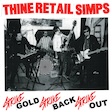 Montreal’s Retail Simps continue to slap garage-rock out of complacency with their finest effort to date, the emphatically titled Strike Gold Strike Back Strike Out. There they are on the cover, mid-rock out, poised like the Mummies if the Mummies were regular guys downstairs and not, well, mummies, and they’re confident enough that even the drummer is allowed to wear sunglasses while playing! They continue to thread together some of my favorite aspects of garage-y punk rock abandon: the stupid-smart genius of The Penetrators, Black Randy’s charming petty nihilism, the unearned confidence of teenaged Back From The Grave one-offs, all with more swaggery attitude than needed to make it snap into place. “Garage” is probably the right bucket designation, but the ‘Simps slosh and slide way outside of the typical genre lines, as likely to tear-stain a ballad as ignite their amps in a bar-clearing freakout. There’s no clear frontman here, either – it seems like everyone in the band is singing at any given time, sometimes in unison, like the Ninja Turtles if they were three different Raphaels and a Michaelangelo. I’d enjoy a lesser band’s attempts at pulling this off, but (Thine) Retail Simps put together the neat trick of upping their technical muscianship while simultaneously sounding bigger and wilder. Who else would be audacious enough to not only end the A-side and start the B-side with the same repetitive tune, but also close the album with the whacked-out disco send-up of “Duckland ($imps Out)”? Rodney Bingenheimer would’ve named a drink special after these guys at his English Disco had this record came out in 1975.
Montreal’s Retail Simps continue to slap garage-rock out of complacency with their finest effort to date, the emphatically titled Strike Gold Strike Back Strike Out. There they are on the cover, mid-rock out, poised like the Mummies if the Mummies were regular guys downstairs and not, well, mummies, and they’re confident enough that even the drummer is allowed to wear sunglasses while playing! They continue to thread together some of my favorite aspects of garage-y punk rock abandon: the stupid-smart genius of The Penetrators, Black Randy’s charming petty nihilism, the unearned confidence of teenaged Back From The Grave one-offs, all with more swaggery attitude than needed to make it snap into place. “Garage” is probably the right bucket designation, but the ‘Simps slosh and slide way outside of the typical genre lines, as likely to tear-stain a ballad as ignite their amps in a bar-clearing freakout. There’s no clear frontman here, either – it seems like everyone in the band is singing at any given time, sometimes in unison, like the Ninja Turtles if they were three different Raphaels and a Michaelangelo. I’d enjoy a lesser band’s attempts at pulling this off, but (Thine) Retail Simps put together the neat trick of upping their technical muscianship while simultaneously sounding bigger and wilder. Who else would be audacious enough to not only end the A-side and start the B-side with the same repetitive tune, but also close the album with the whacked-out disco send-up of “Duckland ($imps Out)”? Rodney Bingenheimer would’ve named a drink special after these guys at his English Disco had this record came out in 1975.
T.T.T.T. I Saw You On The Bloody Floor 7″ (Record Beach)
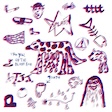 Eyes & Flys released a slew of singles on their own unnamed label over the last handful of years, and now bandleader Pat Shanahan has formalized things under the name of Record Beach. Alongside a new Eyes & Flys single (holy moly, is it their ninth since 2019?), Shanahan offered up a slot to fellow Buffaloans T.T.T.T. They’ve got a similar mindset, taking a pretty traditional garage-rock sound and running the whole thing through crusty slap-back delay until mildly psychedelic results are achieved. The gory title track stomps and swings like vintage Ty Segall and Oh Sees, a ’60s dance-party with a blown-out recording. “Mountain King Killed My Car” is more typical garage fun – it runs on classic revved-up ring-outs – and the same sensation extends through the final track, “On The Sleigh Of The Damned”, going three-for-three on song titles long enough for a screamo band. “On The Sleigh Of The Damned” finds space for a cool vocal melody, Jack White-ish in a good way, and a ripping guitar solo on the level of Purling Hiss. The cover art is printed in offset blue/red on a white background, yet they didn’t bother to include a pair of 3D glasses: I guess Record Beach assumes that its audience already has a pair handy, which is fair.
Eyes & Flys released a slew of singles on their own unnamed label over the last handful of years, and now bandleader Pat Shanahan has formalized things under the name of Record Beach. Alongside a new Eyes & Flys single (holy moly, is it their ninth since 2019?), Shanahan offered up a slot to fellow Buffaloans T.T.T.T. They’ve got a similar mindset, taking a pretty traditional garage-rock sound and running the whole thing through crusty slap-back delay until mildly psychedelic results are achieved. The gory title track stomps and swings like vintage Ty Segall and Oh Sees, a ’60s dance-party with a blown-out recording. “Mountain King Killed My Car” is more typical garage fun – it runs on classic revved-up ring-outs – and the same sensation extends through the final track, “On The Sleigh Of The Damned”, going three-for-three on song titles long enough for a screamo band. “On The Sleigh Of The Damned” finds space for a cool vocal melody, Jack White-ish in a good way, and a ripping guitar solo on the level of Purling Hiss. The cover art is printed in offset blue/red on a white background, yet they didn’t bother to include a pair of 3D glasses: I guess Record Beach assumes that its audience already has a pair handy, which is fair.
Weegee Primitive Thrill LP (Dot Dash Sounds)
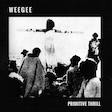 Weegee shoot their debut record Primitive Thrill high into the smog-choked downtown NYC sky, like a bat-signal designed to attract Bob Bert and Kid Congo Powers. Right off the bat, they’ve got a very nice gutter-glam sound going, big sleazy Scientists riffs played with the lumbering swagger of Feedtime and a wicked toothy smile cracking through the cigarette smoke as the Lower East Side back-bar stage grows more and more swamp-like. There’s an accidental Brainbombs riff replication on “Spellbound” (compare with “Kill Them All”), a good dose of wild “1970”-Stooges sax flair (the title track)… if Art Gray isn’t caught lurking in the alley behind the gig at some point, I’d have to imagine he’s either dead or in jail. I’m not sure where the members of Weegee came from, but it has to be from some other bands, as the sound they’ve put together on Primitive Thrill is too dead-on and studied (in a good way) to be a happy accident or first attempt. Lotta noise-rock ends up being the diametric opposite of sexy, but Weegee bury a little romance in their filth, a loud, greasy rock band where some couple making out in the corner wouldn’t be entirely out of place. There’s definitely some room for non-monogamy in Primitive Thrill‘s sullen, smoke-stained grooves, though whether or not it’s ethical remains to be seen.
Weegee shoot their debut record Primitive Thrill high into the smog-choked downtown NYC sky, like a bat-signal designed to attract Bob Bert and Kid Congo Powers. Right off the bat, they’ve got a very nice gutter-glam sound going, big sleazy Scientists riffs played with the lumbering swagger of Feedtime and a wicked toothy smile cracking through the cigarette smoke as the Lower East Side back-bar stage grows more and more swamp-like. There’s an accidental Brainbombs riff replication on “Spellbound” (compare with “Kill Them All”), a good dose of wild “1970”-Stooges sax flair (the title track)… if Art Gray isn’t caught lurking in the alley behind the gig at some point, I’d have to imagine he’s either dead or in jail. I’m not sure where the members of Weegee came from, but it has to be from some other bands, as the sound they’ve put together on Primitive Thrill is too dead-on and studied (in a good way) to be a happy accident or first attempt. Lotta noise-rock ends up being the diametric opposite of sexy, but Weegee bury a little romance in their filth, a loud, greasy rock band where some couple making out in the corner wouldn’t be entirely out of place. There’s definitely some room for non-monogamy in Primitive Thrill‘s sullen, smoke-stained grooves, though whether or not it’s ethical remains to be seen.
White Suns Dredging Heaven LP (Decoherence)
 Populist, pit-friendly noise-rock has been having its own little moment lately, but that’s pretty far removed from what New York’s White Suns are up to. They’ve been around for quite a while now – long enough to have previously released an album on Load Records, one of the pinnacles of American noise-rock achievement – and on Dredging Heaven, their sixth full length, they continue on their own staunchly un-moshable path. On the a-side, there’s a whole lot of blasting, with beats that verge on a less-restrictive form of grind-core, an overt aggression that dominates even the most belligerent listener into uneasy compliance. They’ve always been a group where it can be difficult to discern if the songs are savvy improvisations or demented compositions, and my confusion remains in tact here. While there’s plenty of speed and power on display, the ‘Suns shift easily into the steady thrum of rumbling drones, as corrosive and deep as a passenger jet that runs on a coal engine, but the controlled chaos is always around the next corner. “Passing Resemblance”, if in fact free, is free-rock on par with Sightings’ and Black Dice’s early material, back when tumbling combativeness was a key tenet of their respective sounds. On the second side, White Suns pop every remaining blood vessel through “Star Diagonal”‘s barely ninety seconds before “Forking Paths” shuts the album down across a sprawling sixteen minutes, ominously hovering like an alien vessel just outside of the Earth’s atmosphere and refusing to make its intentions clear. You’ll have to listen for yourself to find out if they decide to annihilate us or not – no spoilers here!
Populist, pit-friendly noise-rock has been having its own little moment lately, but that’s pretty far removed from what New York’s White Suns are up to. They’ve been around for quite a while now – long enough to have previously released an album on Load Records, one of the pinnacles of American noise-rock achievement – and on Dredging Heaven, their sixth full length, they continue on their own staunchly un-moshable path. On the a-side, there’s a whole lot of blasting, with beats that verge on a less-restrictive form of grind-core, an overt aggression that dominates even the most belligerent listener into uneasy compliance. They’ve always been a group where it can be difficult to discern if the songs are savvy improvisations or demented compositions, and my confusion remains in tact here. While there’s plenty of speed and power on display, the ‘Suns shift easily into the steady thrum of rumbling drones, as corrosive and deep as a passenger jet that runs on a coal engine, but the controlled chaos is always around the next corner. “Passing Resemblance”, if in fact free, is free-rock on par with Sightings’ and Black Dice’s early material, back when tumbling combativeness was a key tenet of their respective sounds. On the second side, White Suns pop every remaining blood vessel through “Star Diagonal”‘s barely ninety seconds before “Forking Paths” shuts the album down across a sprawling sixteen minutes, ominously hovering like an alien vessel just outside of the Earth’s atmosphere and refusing to make its intentions clear. You’ll have to listen for yourself to find out if they decide to annihilate us or not – no spoilers here!
Zero Key Zero Key 12″ (False Aralia)
 False Aralia is a new label care of Brian Foote, American electronic music enthusiast who works at Kranky and runs Peak Oil, a label whose track record of spotlighting outsider experimental/techno musics is exemplary. He probably didn’t need a new label, but “need” is such a wrong way to think about creating music and labels and art, so excuse me for misspeaking. It seems more like he wanted to crack open a new white-walled space to fill with avant-garde designs, False Aralia being the minimalist home for, at least at this point, two new twelve-inches by Izaak Schlossman, one under the alias of Selfsame and this one as Zero Key. I’ve been digging on this Zero Key one in particular, as it locates a nice little nook for itself, somewhere not quite under the covers of ambient-dub yet not remotely beholden to the buzzing energy of clubs. These soundscapes are very much in line with the softer side of Y2K-era glitchy dub-techno, like Vladislav Delay, Rod Modell and Jan Jelinek, but also with the shared sound-design sensibility of today’s Boomkat-approved lounge-zone experimentalists like Ulla, Mu Tate and Purelink. Across four tracks, the same general soundscape is rinsed in four separate tracks: staccato and refracted percussive elements cut through foggy sectors of low-end and twitchy, syrupy synths, with vocal snippets Magic Eye-d into the mix. Zero Key is hypnotic without monotony, four constantly-shifting cuts capable of scratching any esoteric itch nestled deep within your brain’s right hemisphere.
False Aralia is a new label care of Brian Foote, American electronic music enthusiast who works at Kranky and runs Peak Oil, a label whose track record of spotlighting outsider experimental/techno musics is exemplary. He probably didn’t need a new label, but “need” is such a wrong way to think about creating music and labels and art, so excuse me for misspeaking. It seems more like he wanted to crack open a new white-walled space to fill with avant-garde designs, False Aralia being the minimalist home for, at least at this point, two new twelve-inches by Izaak Schlossman, one under the alias of Selfsame and this one as Zero Key. I’ve been digging on this Zero Key one in particular, as it locates a nice little nook for itself, somewhere not quite under the covers of ambient-dub yet not remotely beholden to the buzzing energy of clubs. These soundscapes are very much in line with the softer side of Y2K-era glitchy dub-techno, like Vladislav Delay, Rod Modell and Jan Jelinek, but also with the shared sound-design sensibility of today’s Boomkat-approved lounge-zone experimentalists like Ulla, Mu Tate and Purelink. Across four tracks, the same general soundscape is rinsed in four separate tracks: staccato and refracted percussive elements cut through foggy sectors of low-end and twitchy, syrupy synths, with vocal snippets Magic Eye-d into the mix. Zero Key is hypnotic without monotony, four constantly-shifting cuts capable of scratching any esoteric itch nestled deep within your brain’s right hemisphere.

